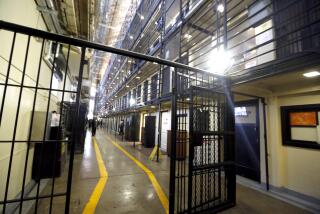Dysfunctional death row
One thing -- maybe the only thing -- that supporters and opponents of capital punishment can agree on is that the ultimate penalty is neither swift nor sure. The average wait for execution for California death row inmates is 17.2 years, double the national figure.
A federal appeals court judge from Los Angeles who has dealt with the death penalty as a prosecutor, judge and parole board member is warning that such “woeful inefficiencies” might someday lead the U.S. Supreme Court to conclude that such delays are themselves “cruel and unusual punishment.” But Judge Arthur L. Alarcon, who serves on the U.S. 9th Circuit Court of Appeals -- a court that itself has been accused of dragging out the implementation of the death penalty -- believes that death penalty appeals can be expedited without compromising the due-process rights of defendants.
In an article in the Southern California Law Review, Alarcon makes several suggestions: better compensation for defense lawyers, a state constitutional amendment that would transfer automatic review of death sentences from the California Supreme Court to state appeals courts, a provision that the same attorneys represent inmates in state and federal habeas corpus proceedings, and federal funding for state courts “to enable them to honor their responsibility to ensure that death row inmates’ federal constitutional rights are fully protected.”
Alarcon’s ideas pose a dilemma for those -- including us -- who believe that capital punishment is both unworthy of an enlightened society and inevitably unequal in its application. In an interview with The Times’ Henry Weinstein, the judge mused that the political system “may be comfortable with a de facto abolition of capital punishment.” Should critics of capital punishment take the same view? Or hope that a future U.S. Supreme Court, confronted with a dysfunctional system like California’s, might declare the death penalty unconstitutional?
We don’t think so -- and not only because the nation’s highest court as now constituted is unlikely to render any sweeping decision against the death penalty. The late Supreme Court Justice Harry A. Blackmun famously vowed that “from this day forward, I no longer shall tinker with the machinery of death.” But that proclamation didn’t provide much useful advice for the public officials Alarcon was addressing in his article. So long as the “machine” exists, they are obligated to make it work in a way that vindicates both the rights of death row inmates and the public’s expectation that appeals will not go on indefinitely.
More to Read
A cure for the common opinion
Get thought-provoking perspectives with our weekly newsletter.
You may occasionally receive promotional content from the Los Angeles Times.






